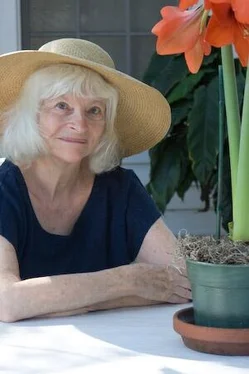Simultaneously, Katherine had several reactions: she was deeply pleased that Iz seemed to like her, but apprehensive about having told him so much. She hadn’t confided in anyone like this since college, when after all she had had nothing much to tell. But like many people who have the habit of reticence, once she had started she couldn’t seem to stop. Also, she was confused by Iz’s style (part colloquial Californian, part European psychologist), curious about and jealous of his wife, and ashamed of the way she had spoken of her husband.
“Paul isn’t really so awful,” she said. “I don’t want you to think that. I mean, I suppose he has an excuse, in a way.”
“Oh? How is that?”
“Well.” Katherine looked down and sideways. “Because, you know. Marriage is rather hard on men.”
“No,” Iz said. “I don’t know. How is marriage hard on men?”
Katherine glanced up; his expression was serious, not ironic; all the same she resented being made to say it out.
“Well, because they have greater needs than women do. And I suppose Paul has more than the average man. ... And I ... Her voice, which had been growing fainter, died out entirely.
“Ah, nonsense.”
“You don’t think that’s true?”
“Not in my experience. If you’re speaking in terms of basic erotic drive. Naturally there is the problem of blockage, but that’s just superficial. And no doubt you have, occasionally, the effects of chronic disease, low vitality, faulty hormone balance. But this applies to both sexes, and it would be obvious that the person was physically ill.”
Katherine wondered if it were obvious to Iz that she was ill. Of course she did have a chronic sinus condition; even today—She suddenly realized that her terrible headache had almost disappeared, while she wasn’t watching it. Almost completely disappeared! She had to frown, now, to feel it at all.
“I suppose it comes to the same thing,” she said, frowning.
Iz looked at her as if he were deciding which of several things to say. He pulled at his beard several times.
“Let me ask you,” he began finally. “I get the impression that you and your husband have had, let us say, a silent agreement: You will allow him to be unfaithful, and he will keep his affairs to himself.”
“No,” Katherine exclaimed. “He’s never said anything like that. Neither one of us ever mentioned—”
“I said, a silent agreement. ... Let me make another guess. In my observation, people are never found out unless they want to be found out. It occurs to me that perhaps your husband arranges to leave these clues. I don’t mean consciously, deliberately. He just gets careless; I have done this myself. Maybe he wants to have a scene, to prove that you love him. Or he would like this affair to end now, but he doesn’t know how to arrange it. He wants to be able to say to his friend: ‘We have to stop seeing each other; my wife is getting suspicious.’ I don’t ask you to accept this now,” he added, observing Katherine’s expression. “But try a little experiment. Don’t say anything to him this time. If this clue isn’t picked up, I bet there’ll be others. Wait and see.”
“All right,” Katherine said. She didn’t know what good Iz’s plan was, but at least it would postpone a very unpleasant scene. And it did make her feel, for the first time since yesterday, or much longer, that she was in control. Or was she only pretending to be? A cool wind blew through the courtyard; the shadows seemed grayer.
Katherine looked at her watch. “Oh, lord. It’s almost five.”
“Okay. Let’s go.” Iz stood up, and placed on the table a tip greater than the price of the ice-cream. They made their way back through the shop to the street.
“Would you like a ride home?” he asked.
“No, thank you. I have to go to Bullock’s to pick up some shoes.” But also she wanted to get away from Iz, in order to think over what he had said.
“Okay. I’ll drop you off on the way to my place.”
Here on the street, in the car, Katherine did not want to go on discussing the personal matters which crowded her mind. She felt the need of some conventional conversation, to re-establish balance.
“You live quite near Bullock’s, don’t you?”
“Um, up the other side of the campus.” Iz turned the corner between the yellow and red lights, with a screech. “On Gayley.”
She knew this, of course. “Is your apartment nice?”
“Great. I’ve got a superb view in three directions. North, south, and east. At night it’s out of this world. Ah, you psychotic bastard!” He braked with a jolt, inches behind another car. “Why didn’t you keep going?”
“I’d—” Katherine clutched at the seat, and avoided falling forward. “I’d uh like to see it.”
Waiting for the light, Iz turned round and looked at her through his dark glasses, with what seemed unnecessary intentness.
“I’d like to show it to you,” he said. “But I have a problem.” He gunned the engine nervously. “I only let women into my apartment when it’s understood that I’m going to sleep with them.”
Katherine flushed, and looked into her lap. “Oh, I see,” she uttered.
“It avoids misunderstanding. Here you are.” He drew up with a squeal of the brakes at the back door of Bullock’s.
“Well, thank you very much,” Katherine said. This time she did not bother trying to work the handle; she stood up in the car, and before Iz could come round to open the door for her she climbed out over the window-sill, so fast that she tripped and nearly fell onto the sidewalk.
15
IN HIS OFFICE AT the Nutting Research and Development Corporation, Paul sat with his head on his hands in front of disordered layers of paper—the notes and material for his history of the company. All colors: pink, yellow, white, beige—all sizes: they were like flakes of paint fallen onto his desk from some high, invisible ceiling—broken, meaningless messages.
He had just returned from an interview with Howard Leon, the head of the Publications Department, concerning his history. Nearly two months ago he had handed in the first draft. It really wasn’t a bad job, either. He had gone to a lot of trouble to get the data together: looking up old city records, asking questions all over the building, searching in the backs of filing cabinets. As he had pieced it together, the growth of N.R.D.C. made an interesting and impressive story.
But since January he had had no word on it. Apparently the manuscript had just vanished into the interstices of the Nutting bureaucracy. All he could ever get out of Howard Leon was that “they were looking it over” in the central office.
Now, just as last summer, Paul sat at his desk with nothing to do. When he complained of this, he would be handed a pile of other people’s reports, press releases, and technical descriptions, and asked to go over them for style—“Take out the grammatical errors—you know, give it the Harvard touch.” So he would work his way through reports on things called “scintillation detectors” or “interlock resistor mechanisms” in which there were, of course, no grammatical errors. Sometimes he would sit for minutes at a time, though, staring at a sentence like “In the presence of radiation peaks, the speaker of the peak squeaker emits squeaks.”
Or he would write letters. Or he would look out of the window. Or he would go to Ceci’s, which was fine until Tomaso and Carmen moved in.
What had happened to the history? He had got tired of wondering; this morning he had decided he was going to solve (or as they said here “stabilize”) the problem—he would go in and confront Leon.
The Department Head’s office was spacious, well and indirectly fit. It faced west, and should have had a view of the sea. But, just as in Paul’s cubicle, the architect had placed the window so far up the wall that when you were sitting down all you could see were the dusty tops of a few palms and the pale, empty sky. Leon sat in a complex steel swivel chair behind a large L-shaped desk: he was a rather small man with the battered face and inscrutable expression of the wise old rancher in TV Westerns.
Читать дальше












